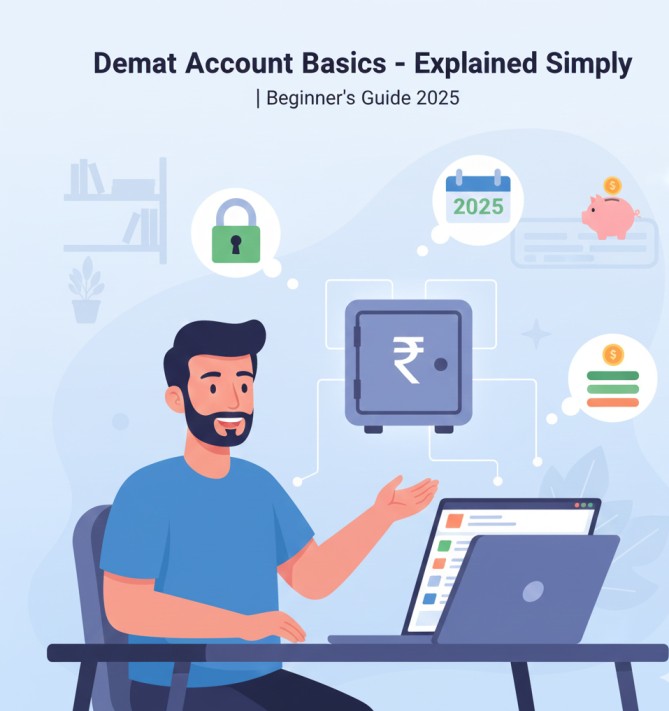New to investing? Learn what a Demat account is, how it works, charges, benefits, step-by-step opening guide, real-life stories, mistakes to avoid, and best tips for beginners in India 2025.

💡 Strong Intro
If you’re planning to invest in stocks, mutual funds, IPOs, or ETFs in India, the first thing you need is a Demat Account.
But for most beginners, Demat accounts feel confusing, filled with technical terms like DP, brokerage, AMC, and CDSL.
Don’t worry — this guide explains everything in the simplest Indian way, with real examples and relatable stories.
By the end of this article, you’ll know:
- What a Demat account is
- How it works
- Why you need it
- How much it costs
- How to open one
- What beginners should avoid
Let’s make “stock market basics” simple and stress-free.
⭐ Key Takeaways
- A Demat account stores shares digitally, like a bank account stores money
- Mandatory for stocks, IPOs, ETFs, and trading
- You can open it online in 10 minutes
- Choose low-cost brokers for beginners
- Avoid unnecessary charges
- Don’t trade without knowledge
- Beginners should start with SIP & safe options before trading
📘 Table of Contents
- 📦 What Is a Demat Account?
- 🔗 How Does a Demat Account Work?
- 🏦 Demat vs Trading Account – Simple Difference
- 💡 Why Do You Need a Demat Account in 2025?
- 🧾 Charges You Should Know (Simplified)
- 🪜 Step-by-Step Guide to Open a Demat Account
- 🇮🇳 Real Indian Stories (4–5 Examples)
- 📊 Comparison Tables
- 👍 Pros & Cons of Demat Accounts
- ⚠️ Common Mistakes Beginners Make
- 🛠️ Tools & Apps You Can Use
- 🔗 Useful Internal Links
- 🎯 Who Should Open a Demat Account?
- 📋 Quick Checklist
- ❓ FAQs (5)
- 🧾 Final Summary
📦 What Is a Demat Account?
A Demat Account (Dematerialised Account) is like a digital locker where your shares and investments are stored online.
Just like a bank keeps your money safely,
a Demat account keeps your stocks safely.
You need a Demat account for:
- Shares
- IPO allotments
- ETFs
- Bonds
- Government securities
- Gold ETFs
- REITs & InvITs
If you’re planning SIPs only, you may not need Demat, but for direct equities you definitely need it.
For simple investing, also read:
👉 SIP for Beginners – Start with ₹500
https://savewithrupee.com/sip-for-beginners-start-with-₹500/
🔗 How Does a Demat Account Work?
A Demat account has 3 major parts:
1. Depository (CDSL/NSDL)
These are like RBI of stock storage.
They keep your shares safely.
2. Depository Participant (DP)
The company/broker you open your account with. Examples:
- Groww
- Zerodha
- Upstox
- Angel
- ICICI Direct
3. Your Demat Account
Where your shares are stored digitally.
Simple Example:
You buy shares → Broker processes → CDSL stores → Shares show in your Demat.
🏦 Demat vs Trading Account – Simple Difference
| Feature | Demat Account | Trading Account |
|---|---|---|
| Purpose | Stores shares | Buys/sells shares |
| Example | Digital locker | Online shop for shares |
| Required for | Holding stocks | Trading in stocks |
👉 You need BOTH to invest in the stock market.
Think of Trading account as a “delivery partner”
and Demat account as the “home” where shares are stored.
💡 Why Do You Need a Demat Account in 2025?
✔ For stocks
Mandatory for buying shares.
✔ For IPO
If you want to apply for IPOs, you need a Demat.
✔ For safe storage
No physical certificates, no loss, no damage.
✔ For quick transfers
Buying and selling becomes smooth.
✔ For modern investing
2025 investing is digital — Demat is a must.
If you want long-term wealth instead of trading, read:
👉 How to Build Wealth Slowly in India
https://savewithrupee.com/how-to-build-wealth-slowly-in-india/
🧾 Charges You Should Know (Simplified)
1. Account Opening Charges
Often ₹0 (free).
2. AMC – Annual Maintenance Charge
₹100–₹500 per year.
3. Brokerage
Charges when you buy/sell shares.
4. DP Charges
When you sell shares, usually ₹10–₹15.
5. GST & Taxes
Standard government charges.
Important Tip:
Always compare charges before choosing your broker.
🪜 Step-by-Step Guide to Open a Demat Account
Step 1 — Choose a Broker (DP)
Easy-to-use ones for beginners: Groww, Zerodha.
Step 2 — Keep These Documents Ready
- PAN
- Aadhaar
- Bank account
- Mobile number
- Signature photo
- Live selfie
Step 3 — Start Online Process
Fill name, PAN, address, bank details.
Step 4 — Complete e-KYC
Instant Aadhaar OTP verification.
Step 5 — Sign Documents Digitally
ESign using Aadhaar OTP.
Step 6 — Account Activation
Takes 5–15 minutes.
Step 7 — Start Investing
But begin slowly and safely.
Beginners → Avoid F&O trading.
If you prefer safe start, check:
👉 FD vs RD – Which Is Better?
https://savewithrupee.com/fd-vs-rd-which-is-better-for-indians/
🇮🇳 Real Indian Stories (4–5 Examples)
Story 1: Nitesh, 21 – First-Time Investor
Nitesh opened a Demat account to apply for IPOs.
He invested cautiously, never traded aggressively.
His profits grew slowly but safely.
Story 2: Sneha, Homemaker – Learning New Skills
Sneha opened a Demat account during the pandemic.
She learned basics, invested in ETFs, and now manages her own mini portfolio with confidence.
Story 3: Ajay, Delivery Rider – Started with ₹100
Ajay didn’t have big money, but he wanted to learn.
He bought stocks worth ₹100–₹200 to understand markets practically.
Today he invests gradually and responsibly.
Story 4: Sarika, Teacher – Applied for IPOs
Sarika opened a Demat to apply for LIC IPO.
She now applies regularly and invests small amounts monthly.
Story 5: Suresh, IT Employee – Made Mistakes, Then Learned
He started trading without knowledge → lost money.
He reset, learnt basics, and now invests only in long-term SIPs + index funds.
For safer success like him →
👉 Mistakes Indians Make with Money
https://savewithrupee.com/5-money-mistakes-indians-make-in-their-20s/
📊 Comparison Tables
Full-Service vs Discount Brokers
| Feature | Full-Service Brokers | Discount Brokers |
|---|---|---|
| Charges | Higher | Lower |
| Tools | Advanced | Simple |
| Research | Provided | Minimal |
| Best For | Serious traders | Beginners |
Demat vs Savings Account
| Feature | Demat | Savings Account |
|---|---|---|
| Stores | Shares | Money |
| Risk | Depends on market | None |
| Mandatory | For investing | For banking |
👍 Pros & Cons of Demat Accounts
Pros
- Safe storage
- Easy buying & selling
- Faster settlements
- Digital records
- Mandatory for IPOs
Cons
- Charges involved
- Beginners may misuse
- Risky if you trade without knowledge
⚠️ Common Mistakes Beginners Make
- Trading without learning basics
- Falling for tips & rumours
- Not checking brokerage charges
- Confusing trading with investing
- Using entire salary to trade
- Expecting quick profits
Better approach for new investors:
👉 Mutual Fund vs FD – Which Is Better?
https://savewithrupee.com/mutual-fund-vs-fixed-deposit-which-is-better-in-india-2025-complete-beginners-guide/
🛠️ Tools & Apps You Can Use
- Groww
- Zerodha
- Angel One
- Upstox
- ET Money
- Moneycontrol
- Tickertape
For budgeting parallelly:
👉 Best Free Budgeting Apps
https://savewithrupee.com/best-free-budgeting-apps-in-india-2025-edition/
🔗 Useful Internal Links
All from your sitemap:
- Savings hacks
https://savewithrupee.com/15-daily-money-hacks-to-save-₹10000-this-year/ - Wealth building
https://savewithrupee.com/how-to-build-wealth-slowly-in-india/ - Passive income
https://savewithrupee.com/passive-income-ideas-in-india-2025-edition/ - Credit score basics
https://savewithrupee.com/credit-score-in-india-beginners-guide/
🎯 Who Should Open a Demat Account?
- Students learning investing
- Young professionals
- Homemakers trying long-term investing
- Side-income seekers
- Anyone wanting stocks, ETFs, or IPOs
- Long-term wealth builders
📋 Quick Checklist
✔ PAN + Aadhaar ready
✔ Compare broker charges
✔ Avoid trading initially
✔ Invest small amounts first
✔ Use Demat for long-term holding
✔ Keep emergency fund separate
✔ Learn basics before taking risk
❓ FAQs (5)
1. Is a Demat account compulsory for SIP?
No. Only for stocks, IPOs, ETFs.
SIP in mutual funds does NOT require Demat.
2. Can a student open a Demat account?
Yes, if they have PAN & Aadhaar.
3. What’s the safest way to start investing?
Begin with SIPs, index funds, and avoid F&O trading.
4. Is Demat account expensive?
Most brokers offer free account opening with low charges.
5. Can I have multiple Demat accounts?
Yes, but beginners don’t need more than one.
🧾 Final Summary
A Demat account is your gateway to modern investing.
It’s simple, digital, and easy to manage.
Combined with safe investing habits, it can help you build wealth slowly and confidently.
Start small.
Learn basics.
Grow steadily.
And invest only what you understand.
Disclaimer: This article is based on personal experience and is for educational purposes only. It does not constitute financial, investment, or legal advice. Readers are advised to do their own research or consult a qualified professional before making any financial decisions.


